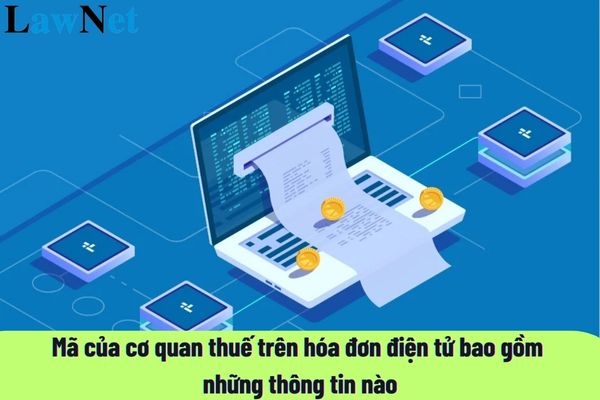Vietnam: What information does the tax authorities’ authentication code on an e-invoice include?
Vietnam: What information does the tax authorities’ authentication code on an e-invoice include?
According to the provisions of Article 89 of the Law on Tax Administration 2019 regarding e-invoices as follows:
E-invoice
1. An e-invoice is an invoice with or without a code from the tax authority displayed in e-data form by an organization or individual selling goods or providing services, recording the sale of goods or services information according to regulations of law on accounting, tax law by e-means, including the case of invoices generated from cash registers connected to transmit e-data to the tax authority.
2. e-invoices include value-added tax invoices, sales invoices, e-stamps, e-tickets, e-cards, e-receipts, e-delivery cum transportation notes, or other e-documents with different names.
3. An authenticated e-invoice is an e-invoice to which the tax authority assigns a code before the organization or individual selling goods or providing services sends it to the buyer.
The tax authorities’ authentication code on an e-invoice includes a transaction number, which is a unique sequence generated by the tax authority's system, and a string of characters encrypted by the tax authority based on the seller's information established on the invoice.
4. An e-invoice without a tax authorities’ authentication code is an e-invoice sent to the buyer by the organization selling goods or providing services without a tax authorities’ authentication code.
5. the Government of Vietnam provides detailed regulations for this Article.
Thus, according to the above provisions, the tax authorities’ authentication code on an e-invoice includes:
- Transaction number: a unique sequence generated by the tax authority's system; and
- A string of characters encrypted by the tax authority based on the seller's information established on the invoice.

Vietnam: What information does the tax authorities’ authentication code on an e-invoice include? (Image from the Internet)
What are bases for issuance of tax authorities’ authentication code on an e-invoice in Vietnam?
Based on Article 90 of the Law on Tax Administration 2019 which regulates the principles of creating, managing, and using e-invoices as follows:
Principles of creating, managing, and using e-invoices
1. When selling goods or providing services, the seller must prepare an e-invoice to give to the buyer in the standard data format and must fully record the content as required by tax law, accounting law, regardless of the value of each transaction.
2. If the seller uses a cash register, they must register to use e-invoices generated from cash registers connected for e-data transmission with the tax authority.
3. Registration, management, and use of e-invoices in transactions of selling goods or providing services must comply with laws on e-transactions, accounting, and tax.
4. The issuance of the tax authorities’ authentication code on an e-invoice is based on the information of enterprises, economic organizations, other organizations, business households, and business individuals entered on the invoice. Enterprises, economic organizations, other organizations, business households, and business individuals are responsible for the accuracy of the information on the invoice.
5. the Government of Vietnam provides detailed regulations for this Article.
Thus, according to the above provisions, the issuance of the tax authorities’ authentication code on an e-invoice is based on the information of enterprises, economic organizations, other organizations, business households, and business individuals entered on the invoice.
Accordingly, enterprises, economic organizations, other organizations, business households, and business individuals are responsible for the accuracy of the information on the invoice.
What are regulations on issuance of authenticated e-invoice?
According to Article 17 of Decree 123/2020/ND-CP regulating the creation of authenticated e-invoices as follows:
(1) Access point for creating invoices:
- Enterprises, economic organizations, other organizations, households, and business individuals who are subject to using authenticated e-invoices do not have to pay service fees for 12 months from the start of using e-invoices if they access the General Department of Taxation's e-portal to create invoices using the account provided during registration to execute:
+ Create invoices for selling goods or providing services.
+ Digitally sign the created invoices and send them to the tax authority for coding.
- Enterprises, economic organizations, other organizations, households, and business individuals using authenticated e-invoices through an e-invoice service provider must access the service provider's e-information page or use the provider's e-invoice software to implement:
+ Create invoices for selling goods or providing services.
+ Digitally sign the created invoices and send them through the e-invoice service provider to the tax authority for coding.
(2) Implementing invoice coding
For an invoice to be coded, it must ensure:
- Complete content as per e-invoice requirements.
- Correct format as per e-invoice specifications.
- Correct registration information in accordance with regulations.
- Not be in a situation where the use of authenticated e-invoices has been suspended.
After ensuring the above conditions, the coding system of the General Department of Taxation automatically codes the invoice and returns the coding results to the sender.
(3) Sending e-invoices that have been coded by the tax authority to the buyer
Enterprises, economic organizations, other organizations, households, and business individuals selling goods or providing services are responsible for sending e-invoices that have been coded by the tax authority to the buyer.
The method of sending and receiving invoices is based on the agreement between the seller and the buyer, ensuring compliance with laws on e-transactions.

